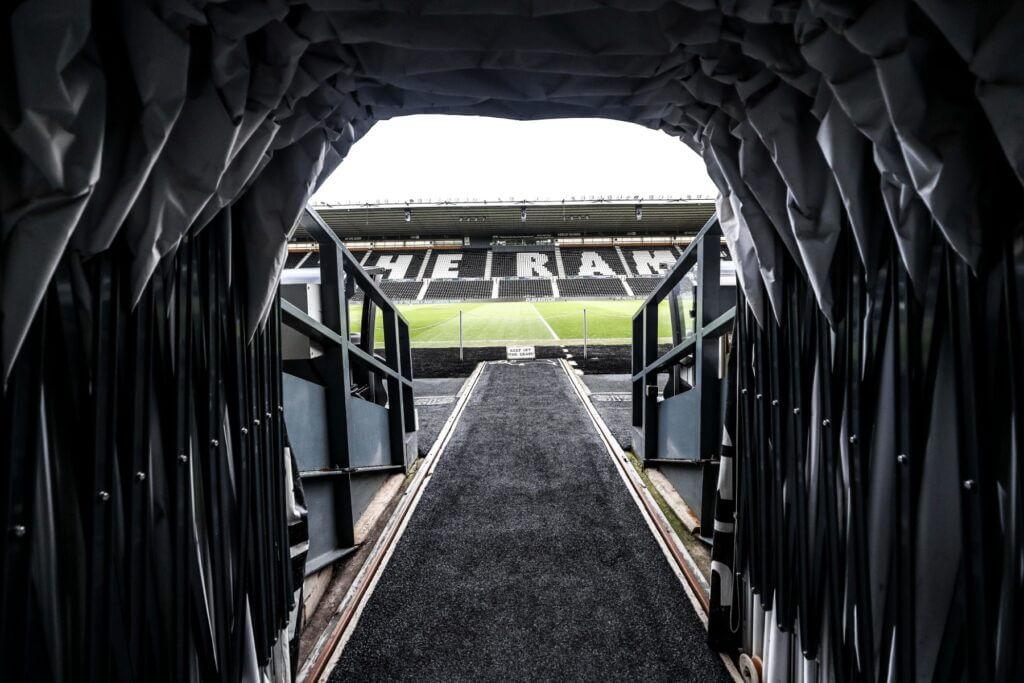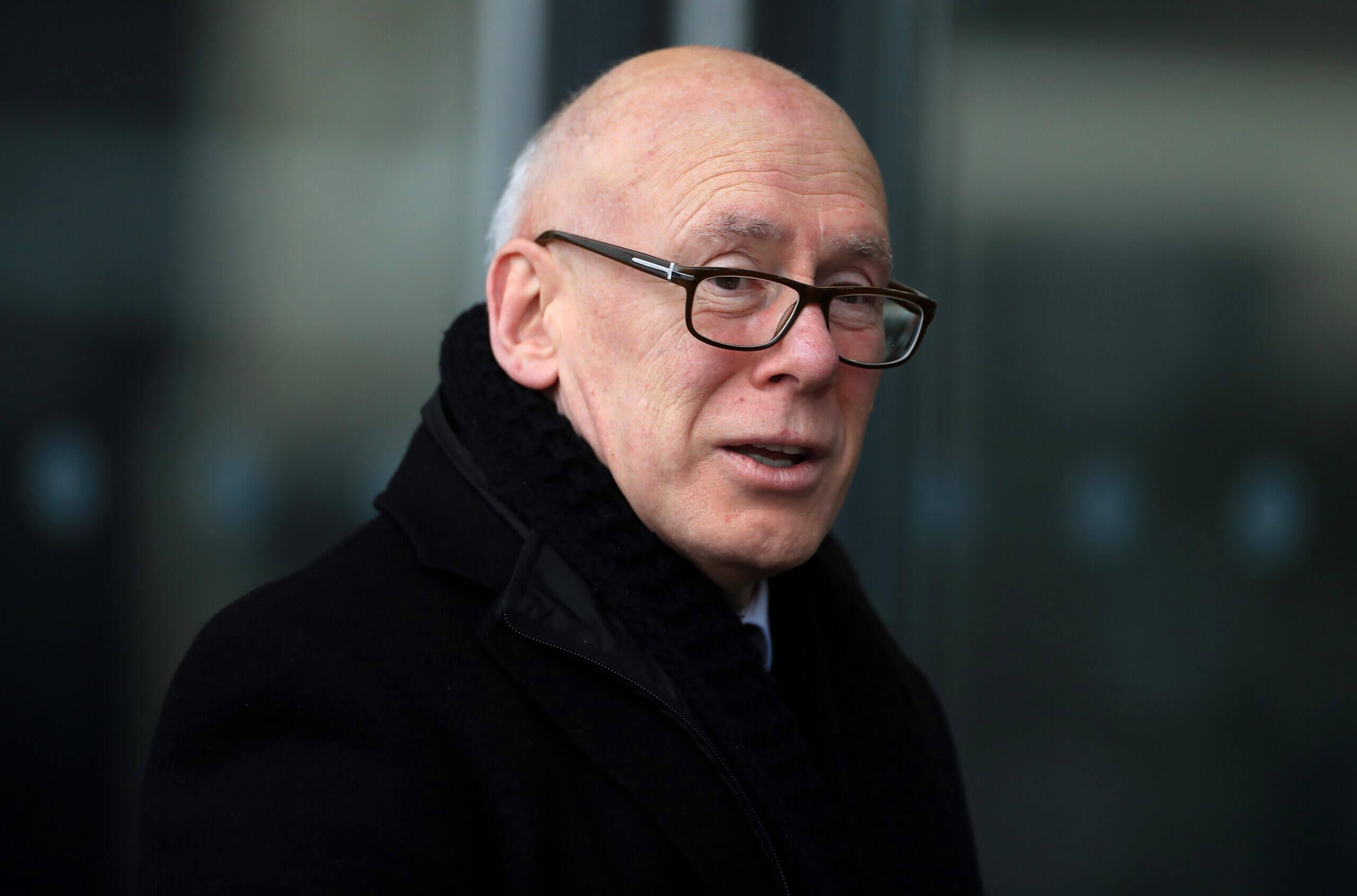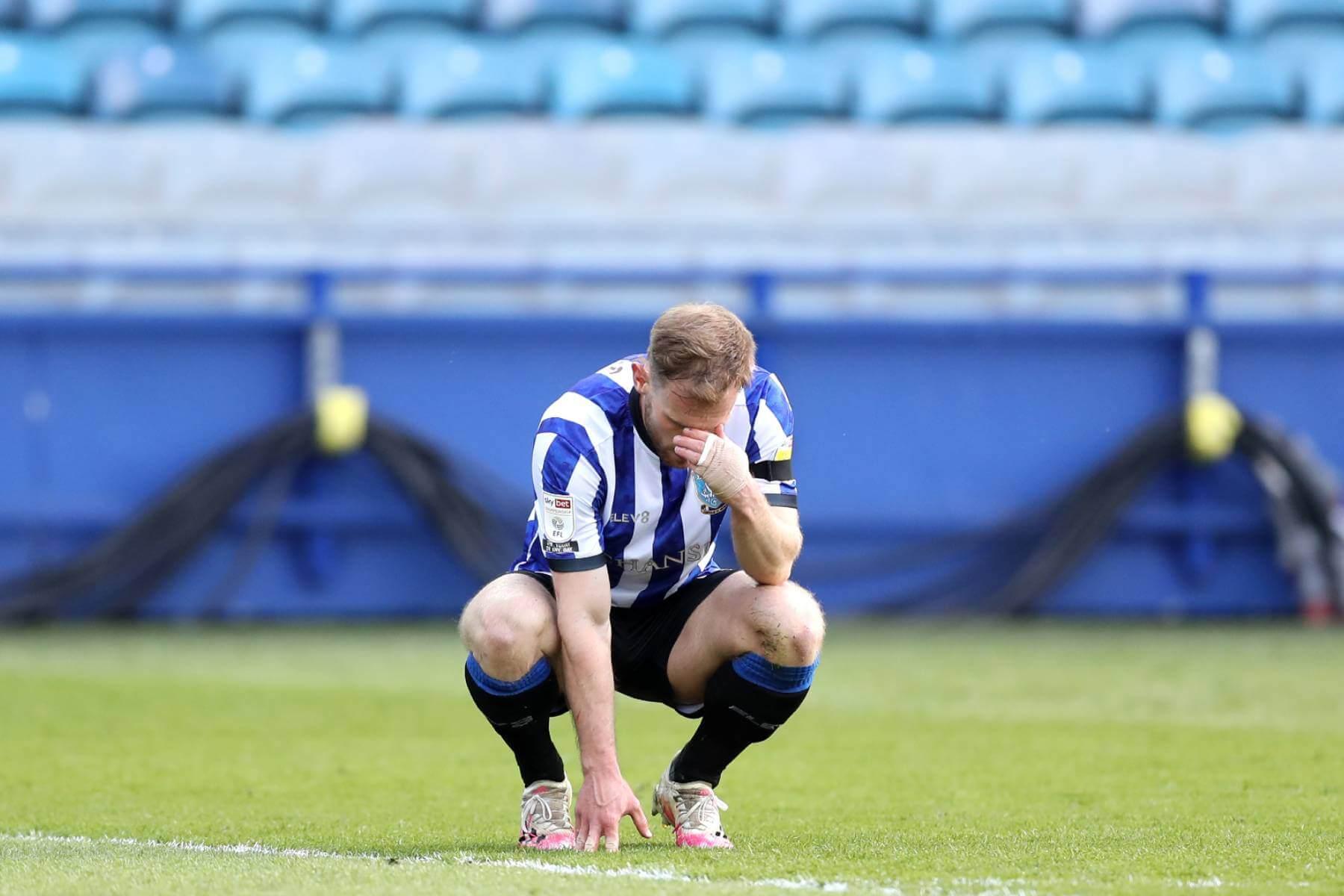Explained: What the EFL’s latest decision means for Derby County’s future

Almost two months after avoiding relegation on the final day of the regular Championship season, Derby County now finally know they will not start their 2021-22 campaign as a League One club. On Friday evening, the English Football League begrudgingly decided not to appeal against the punishment imposed on Derby by an independent disciplinary commission.
The end result? Derby stay up. Wycombe Wanderers stay relegated.
Derby were last month fined £100,000 and ordered to resubmit their accounts by an EFL disciplinary commission. The EFL could have appealed against this verdict and demanded a points deduction, which would have relegated Derby and given Wycombe a reprieve. But the EFL believed it had little chance of such an appeal being successful.
“Following consultation with our legal advisors, the EFL Board has regrettably determined that there are insufficient grounds to appeal the sanction imposed by the Independent Disciplinary Commission,” it said in a curt statement.
So, where does this leave Derby and how will it impact their transfer business and preparation for next season? What do the club need to do next? And what punishments could they be hit with in the future?
Here, we answer your most pressing questions.
So… exactly what happened on Friday?
The EFL said it would not appeal against a decision to only fine Derby for their accounting policies.
An independent disciplinary commission found Derby’s policy regarding the amortisation of player registrations was found to be contrary to standard accounting rules. The club have also been ordered to file restated accounts for the financial years ending on June 30 of 2016, 2017 and 2018.
That means this story is far from over — something not lost on the EFL. “Once these have been submitted, the EFL will then be required to consider the submissions in reference to the P&S (profit and sustainability) rules and in particular re-assess whether the Club has complied with the requirement to limit losses in accordance with those rules,” its statement said.
The EFL also warned “it will apply the full force of the current regulations as appropriate”. You can read the full statement here.
But the EFL’s decision not to appeal for a more severe punishment means Derby will be playing in the Championship when the new season begins next month.
Why did the EFL decide not to appeal?
For the same reason cricket batsmen who miss straight ones when squared up in front of the stumps do not bother going upstairs for a second opinion, the EFL’s lawyers have read the 52-page written judgment and know they would only lose again.
This has not been an easy decision to make because the league feels the three members of the panel have carefully listened to the arguments, dismissed most of Derby’s attempts to tie their hands in terms of sanctions, identified the key points and written a thorough account of how they reached their decision. They believe the panel just got it wrong.
That, of course, is a matter of opinion, and it is not a view shared by Derby or their lawyers.
But even if the league is right about the panel being wrong on the substantive points – did Derby knowingly use a non-compliant accounting method to circumvent the league’s financial fair play (FFP) rules and did they gain a sporting advantage from doing so – was the panel’s view irrationally wrong?
Because unlike the appeal against the same panel’s decision to clear Derby of one of the particulars of the amortisation charge, a black-and-white argument about whether it had made an “error in law”, an appeal against the sanction would be a review of whether the panel had taken leave of its senses. That is quite a high bar.

Derby County chairman Mel Morris (Photo: Getty Images)
In keeping with the entire saga, which started in 2018 when Derby’s owner Mel Morris exploited the legal loophole of selling Pride Park to himself so the club could avoid breaching the league’s limit on permitted losses, many claims and counter-claims were made about what penalty they should face for two breaches of the EFL’s rules: using a non-compliant amortisation method, and therefore filing incorrect accounts, and misleading the league in the process.
Last year, this panel only agreed with the second of those breaches and gave Derby a reprimand. But with the EFL winning an appeal earlier this year on the non-compliance of the club’s “estimated recoverable value” approach to amortisation, the panel now had two breaches to assess when considering an appropriate punishment.
The league’s case was clear: these breaches were significant, the misbehaviour was deliberate, the impact was material and justice should not be delayed. Therefore, enough points should be deducted from Derby’s tally last season to relegate them, instead of Wycombe. Two would be sufficient.
That, the EFL said, is the only way to send a message to every other club that the rules matter, to reward those clubs who followed those rules, to give the rest of the league confidence in the system and to make sure Derby know never to do it again.
The club said not every breach of the rules is a hanging offence. They also argued that deductions are not meant for this type of thing and that it would be disproportionately harsh if a points penalty took them down to the third division.
They also felt that it was too late, anyway, because last season is last season.
The panel agreed with the club’s barrister, Nick De Marco QC, that there are small breaches and big breaches but disagreed with the rest of those arguments. That is fine, said De Marco, because I have lots more — and eventually one landed.
Derby, you see, only stopped using the same straight-line amortisation policy as every other club in the land because their auditor, a partner with local firm and club sponsor Smith Cooper, advised them to.
This advice was professionally given and honestly received, De Marco said. The auditor in question, Andrew Delve, and the club’s chief executive, Stephen Pearce, told the panel exactly the same thing.
The EFL’s barrister, Adam Lewis QC, strongly suggested this was not the case but the league could not prove Derby had acted “dishonestly”, no matter how many times it pointed out no other club did it, the method helped them delay (but not remove) losses and the club failed to tell the league what it was doing.
That was game over for the EFL being able to prove that Derby’s wrongdoing was at the Birmingham City, Macclesfield Town or Sheffield Wednesday end of the spectrum — to cite three recent examples of clubs who have been docked points.

Sheffield Wednesday were docked points last season, and ended up getting relegated (Photo: Getty Images)
And, just to compound its frustration, the league also lost a key argument on whether Derby gained a sporting advantage from being able to reduce their losses for FFP purposes in 2016, 2017 and 2018, which it said enabled them to spend more money than clubs who amortised properly.
The panel said this could not be proven but might be something a future disciplinary commission looks at if Derby are ever found to have breached the £39 million limit for losses over a three-year period. We’ll come back to that.
All that was left for this panel was to come up with a sanction that it felt better met the “pour encourager les autres” — to encourage the others — aims of the EFL, without throwing Derby to the wolves for an offence that was careless and not insignificant but, equally, not entirely their fault. After all, the club still maintain the amortisation method was fine and this panel initially agreed with them.
How have Derby taken the news?
Very well, you will be entirely unsurprised to read.
Derby have always maintained their innocence throughout this process and were extremely frustrated at the timing of the EFL’s statement to announce the £100,000 fine, which was published at 11:30pm.
Derby see the ruling as a positive step that enables them to start rebuilding. But they still have problems: the club will remain under a transfer embargo until their accounts for 2016, 2017 and 2018 are resubmitted.
Wycombe, meanwhile, put out a short statement on Twitter to confirm they would be playing in League One next season.
They have made no further comment on the issue.
Does that mean it’s all over? What happens next?
First, the club must pay the EFL that £100,000 fine by 4pm on Wednesday, July 21.
The panel does not go into detail as to how it reached this figure but does say it found it difficult and was not given any guidance on the matter by the club, unsurprisingly, or the EFL.
Second, Derby must file restated accounts for the three seasons they used their bespoke amortisation method: 2015-16, 2016-17 and 2017-18. There was some debate in the hearing about whether they should do this or the league should do it for them. In the end, all parties seemed to decide that Derby should do it and they have until 4pm on Wednesday, August 18, to do so.
Of these two sanctions — a formal reprimand and warning over future conduct is the third sanction the panel dished out — the league is bewildered by the first, as it believes it simply puts a tariff on breaking the rules, but relatively happy with the second.
The EFL charged Derby in January 2020, so nobody will pretend that getting the club to file some correct accounts between three and five years after the seasons in question is a great result, particularly as the league has had to butt heads with De Marco and Morris for 18 months to do so, but those new numbers may result in fresh charges for the club.
This panel had already cleared Derby’s £81 million valuation of Pride Park, so that one-off gain will remain on 2018’s books, which means the club should be safe, in FFP terms, for that season and for the next two. But what about 2017? Well, now we will know.
What punishments could Derby still be hit with?
For the January 2020 charges? Nothing. The matter is now closed and Wayne Rooney will be able to get on with repairing the holes in his threadbare squad and Morris can continue his two-year search for someone else to pay Derby’s bills and fight their battles.
But the restated accounts may — and the league readily admits it is just a possibility — reveal the club breached the £39 million losses limit before the stadium sale-and-leaseback move.
If that is the case, the club should expect a fresh charge pretty quickly.
But, even if the restated accounts show the club were only sailing close to the wind before 2018, Derby are now on their last warning. The disciplinary commission might have taken a generous view of how and why the club started amortising transfer fees in the way they did but it was more critical of their failure to tell the EFL what they were doing.
And not every disciplinary commission would be so understanding of Derby’s failure to better investigate the amortisation advice its auditor offered. The appeal panel only looked at a narrow aspect of the case but in its written judgment it made its view on Derby’s behaviour pretty clear: those three experts seemed to like the EFL’s arguments more than the three experts on this panel.
What is certain is that the EFL will try to tighten up its rulebook, although that will not be as easy as you might expect, given that one condition of the financial solidarity pact between the EFL and the Premier League is that the two leagues’ rulebooks must align.
There is one relatively straightforward change the league could make, though, and that is to take FFP cases away from arbitration panels and give them to a bespoke panel of experts, along the lines of UEFA’s Club Financial Control Body — the European confederation’s FFP watchdog.
EFL chairman Rick Parry was a member of the CFCB and is understood to believe an EFL equivalent would give quicker and more consistent rulings on financial cases.
What next for Derby? And what does this mean for recruitment?
The EFL imposed a registration embargo on Derby and it will not be lifted until the club have refiled their accounts.
Recruitment this summer has already been impacted.
A contract extension was offered to striker Jack Marriott before the start of last season, for example, but was later rejected by the EFL due to the embargo.
Marriott has since signed for Peterborough United.
Meanwhile, and at almost the exact same time as the EFL published their statement, Coventry City announced the signing of Martyn Waghorn on a two-year contract. Waghorn memorably helped to keep Derby in the Championship by scoring twice against Sheffield Wednesday in the final game of last season, but due to the club’s financial situation and the sanctions imposed upon them this summer, there had been a cap on the wages they could offer him in any new deal.

Martyn Waghorn (centre) signed for Coventry on Friday (Getty Images)
The Athletic understands Derby would have liked to have kept Waghorn (at the right price, of course) but nothing was ever formally offered to him. Had Derby been cleared earlier by the EFL and the independent panel, perhaps a deal could have been struck.
The same goes for Curtis Davies with regards to no formal offer being made to the defender. Davies is at Moor Farm for pre-season training to continue his rehabilitation after an achilles injury in December. The Athletic understands no formal offer has been made to the 36-year-old, even though the club have verbally indicated they would like to retain him.
It is believed Derby are close to securing the return of Manchester United centre-back Teden Mengi on loan for a full season after the 19-year-old was borrowed in January.
With the embargo set to be lifted once Derby refile their accounts, it would signal the start of a rapid recruitment drive that is desperately needed.
Crucially, the EFL’s decision not to appeal also means Morris may find it easier to sell the club.
With Derby remaining in the Championship, free from any points deduction, the club immediately becomes a much more attractive prospect to any prospective bidder.

 56
56 